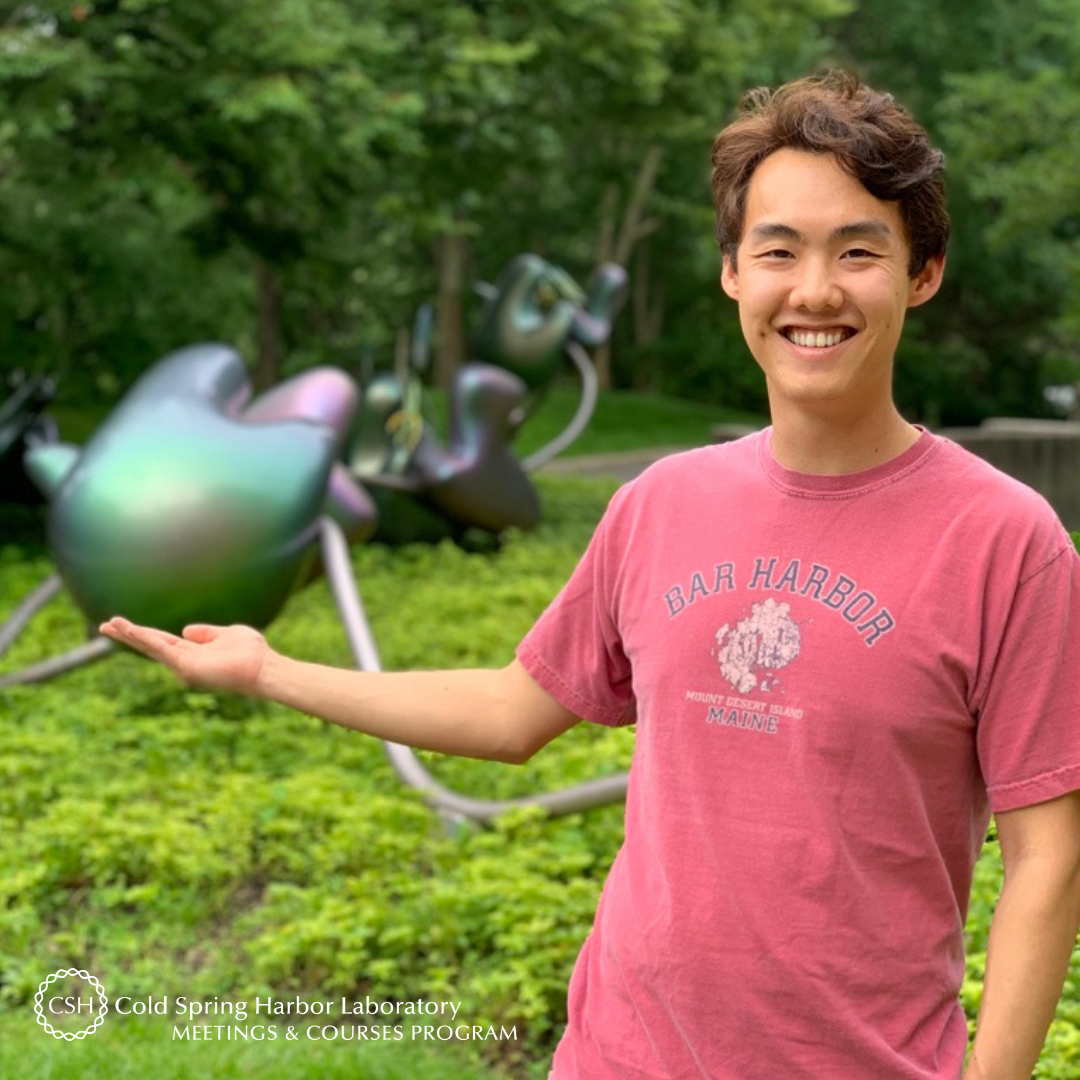Meet Steven Chen of the Indiana University School of Medicine. A third-year PhD student in the Medical Scientist Training Program, Steven is also a member of Yunlong Liu’s lab in the Center for Computational Biology and Bioinformatics. He is on campus for his very first course at CSHL – Advanced Techniques in Molecular Neuroscience – and is considering coming back for the next Genome Informatics meeting.
What are your research interests? What are you working on?
I am interested in the regulation of messenger RNA splicing by RNA-binding proteins in the brain. I am taking an informatics approach to understand these splicing mechanisms that affect posttranscriptional processes.
How did you decide to make this the focus of your research?
I have been interested in RNA processing since my time in Amy Gladfelter’s lab when she was at Dartmouth College. We studied how cells are organized in time and space, specifically how RNA transcripts are trafficked and partitioned within the cell. As my interests developed during undergrad, I became more interested in genomics and how they can inform new hypotheses on molecular mechanisms. With the advent of RNA sequencing, we can now profile thousands of splicing profiles at once. I have made my focus to study RNA processing in the brain since it is particularly enriched in posttranscriptional regulation.
How did your scientific journey begin?
My scientific journey began as a little kid joining my parents on weekend trips to the lab during their postdocs. To pass the time, I would assist my mom in labeling tubes. During my senior year of high school, I worked in Irina Petrache’s lab studying how e-cigarettes and nicotine can damage lung endothelial cells. I would also shadow Dr. Petrache when she saw chronic obstructive pulmonary disease patients in clinic, and this inspired me to become a physician-scientist.
Was there something specific about the Advanced Techniques in Molecular Neuroscience course that drew you to apply?
I was primarily drawn to the Advanced Techniques in Molecular Neuroscience course by the scientific reputation of the instructors and guest speakers. I knew I was here to learn, and it is a blessing to be able to do so from such great minds. In addition, I had been analyzing data from the techniques taught in the course, and I wanted to be able to design and implement these on my own.
What and/or how will you apply what you’ve learned from the course to your work?
Since I come from a largely computational background, I have already learned a lot about the time and effort it takes to carry out experimental techniques like culturing astrocytes, single nuclei isolation, and making bacterial artificial chromosomes. I have also gained more scientific insight into neuroscience and have learned so much about the role of glia. Furthermore, I have acquired newfound appreciation for the history of how we have accumulated all this knowledge in the field. This will inform my critical thinking in discussions with my colleagues at home.
What is your key takeaway from the course?
The culture of being in Cold Spring Harbor almost magically allows course participants to freely speak about scientific ideas and even question canonical thinking. The people here are so inquisitive – it is almost like an incubator for new theories of molecular neuroscience. The guests come from all over the globe, but we all share a passion for understanding even the most basic of molecular mechanisms. It is a really special place to be at even if only for just two weeks.
If someone curious in attending this course asked you for feedback or advice on it, what would you tell him/her?
I think it is definitely worth the time spent here. You will not only form many new connections but also lifelong friends! But make sure you come prepared to work hard and be challenged in thinking critically (and also maybe with some late nights in the lab).
What do you like most about your time at CSHL?
The people here are awesome! Among the four courses running concurrently, there is always someone new to meet. It is easy to strike up a new conversation since we are all visitors. And we are constantly able to learn new things since everyone comes from a unique (cultural and scientific) background. The (unlimited) food is also great, so I have to control myself sometimes.
In addition to the Eli Lilly - Stark Neurosciences Fellowship in Neurodegeneration awarded to Steven, he received a fellowship from the Helmsley Charitable Trust to cover a portion of his course tuition. On behalf of Steven, thank you to the Helmsley Charitable Trust and Indiana Clinical and Translational Sciences Institute for supporting and enabling our young scientists to attend a CSHL course where they expand their skills, knowledge, and network.
Thank you to Steven for being this week's featured visitor. To meet other featured scientists - and discover the wide range of science that takes part in a CSHL meeting or course - go here.

